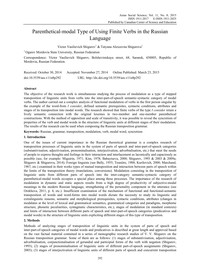Parenthetical-modal Type of Using Finite Verbs in the Russian Language
Покупка
Основная коллекция
Издательство:
Canadian Center of Science and Education
Автор:
Shigurov Victor Vasilievich
Год издания: 2015
Кол-во страниц: 8
Дополнительно
ГРНТИ:
Скопировать запись
Фрагмент текстового слоя документа размещен для индексирующих роботов
Asian Social Science; Vol. 11, No. 8; 2015
ISSN 1911-2017 E-ISSN 1911-2025
Published by Canadian Center of Science and Education
Parenthetical-modal Type of Using Finite Verbs in the Russian Language
Victor Vasilievich Shigurov¹ & Tatyana Alexeevna Shigurova¹
¹ Ogarev Mordovia State University, Russian Federation
Correspondence: Victor Vasilievich Shigurov, Bolshevistskaya street, 68, Saransk, 430005, Republic of Mordovia, Russian Federation.
Received: October 30, 2014 Accepted: November 27, 2014 Online Published: March 23, 2015
doi:10.5539/ass.v11n8p292 URL: http://dx.doi.org/10.5539/ass.v11n8p292
Abstract
The objective of the research work is simultaneous studying the process of modalation as a type of stepped transposition of linguistic units from verbs into the inter-part-of-speech semantic-syntactic category of modal verbs. The author carried out a complex analysis of functional modalation of verbs in the first person singular by the example of the word-from I consider, defined semantic prerequisites, syntactic conditions, attributes and stages of its transposition into modal words. The research showed that finite verbs of the type I consider retain a lively semantic connection with the original lexemes in two-member and one-member parenthetical constructions. With the method of opposition and scale of transitivity, it was possible to reveal the syncretism of properties of the verb and modal words in the structure of linguistic units at different stages of their modalation. The results of the research can be used when composing the Russian transposition grammar.
Keywords: Russian, grammar, transposition, modalation, verb, modal word, syncretism
1. Introduction
One of the issues of current importance in the Russian theoretical grammar is a complex research of transposition processes of linguistic units in the system of parts of speech and inter-part-of-speech categories (substantivisation, adjectivisation, pronominalisation, interjectivation, adverbialisation, etc.) that meet the needs of people to express thoughts and feelings in their interaction and interlacement as laconically and capaciously as possible (see, for example: Miguirin, 1971; Kim, 1978; Babaytseva, 2000; Shigurov, 1993 & 2003 & 2009a; Shigurov & Shigurova, 2014). Foreign linguists (see Bally, 1955; Tesniere, 1988; Kurilovich, 2000; Marchand, 1967, etc.) examined in their works types of mutual transposition and interaction between parts of speech within the limits of the transposition theory (translations, conversions). Modalation consisting in the transposition of linguistic units from different parts of speech into the inter-category semantic-syntactic category of parenthetical-modal words occupies a special place among these processes. The importance of the research of modalation in dynamic and static aspects results from a high degree of productivity of subjective-modal meanings in the modern Russian language, strengthening of the personality component in the utterance (see Orekhova, 2011, p. 4, etc.). Insufficient examination of the mechanism of functional and functional-semantic transposition of words and word-forms into modal words dictate the necessity to study its linguistic and extralinguistic reasons, semantic and morphological prerequisites, syntactic conditions, attributes (changes in modalates at the level of lexical and grammatical semantics, grammatical categories and paradigms, morpheme structure, phonetic peculiarities, syntagmatic characteristics, etc.), stages of modalation (in standard contexts) and limits of interaction between different parts of speech and inter-part-of-speech categories (predicatives and modal words) in the structure of linguistic units expliciting different stages of this type of transposition.
2. Methods
Methods of analyzing stages of transposition of linguistic units in the system of parts of speech and inter-part-of-speech categories of modal words and predicatives is described at great length and approved based on the vast factual material contained in a series of monographic research studies of V. V. Shigurov on the Russian transposition grammar. Some of them are as follows: (1) stages of substantivisation, adjectivisation, adverbialisation, conjunctionalisation of gerundial and participial forms of the verb with negation (Shigurov, 1993); (2) stages of pronominalisation of linguistic units of different part-of-speech assignments (Shigurov, 2003); (3) stages of interjectivation of linguistic units of different parts of speech and concurrent transposition
292


